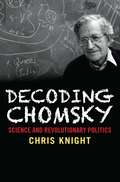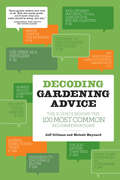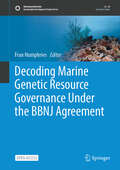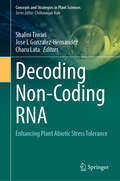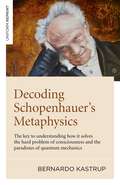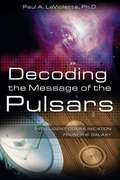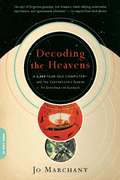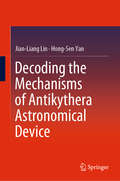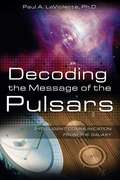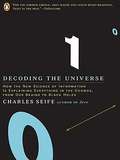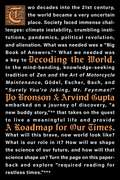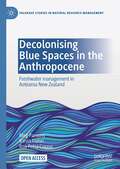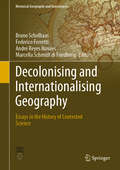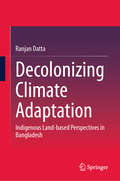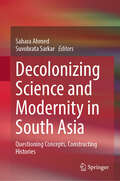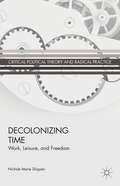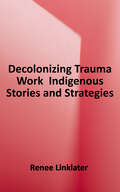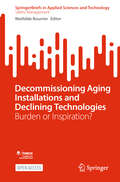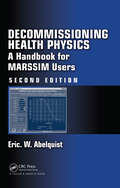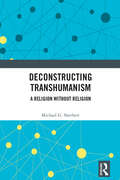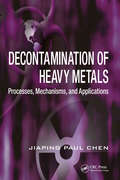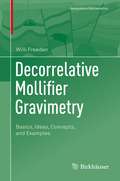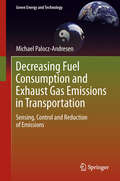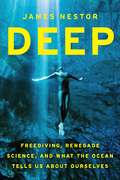- Table View
- List View
Decoding Chomsky: Science and Revolutionary Politics
by Chris KnightA fresh and fascinating look at the philosophies, politics, and intellectual legacy of one of the twentieth century's most influential and controversial minds Occupying a pivotal position in postwar thought, Noam Chomsky is both the founder of modern linguistics and the world's most prominent political dissident. Chris Knight adopts an anthropologist's perspective on the twin output of this intellectual giant, acclaimed as much for his denunciations of US foreign policy as for his theories about language and mind. Knight explores the social and institutional context of Chomsky's thinking, showing how the tension between military funding and his role as linchpin of the political left pressured him to establish a disconnect between science on the one hand and politics on the other, deepening a split between mind and body characteristic of Western philosophy since the Enlightenment. Provocative, fearless, and engaging, this remarkable study explains the enigma of one of the greatest intellectuals of our time.
Decoding Gardening Advice: The Science Behind the 100 Most Common Recommendations
by Jeff Gillman Meleah MaynardCovering more than 100 universal gardening "dos and don'ts," Decoding Gardening Advice is the first book to provide gardeners with the real answers. Jeff Gillman, the bestselling author of The Truth About Garden Remedies, and Meleah Maynard back up every good recommendation with sound horticultural and botanical science. Decoding Gardening Advice is the first and only hard-hitting, evidence-based book that every gardener needs for definitive advice on everything from bulbs, annuals, and perennials to edibles, trees, and soil care.
Decoding Marine Genetic Resource Governance Under the BBNJ Agreement (Sustainable Development Goals Series)
by Fran HumphriesThis open access book provides practical guidance for understanding the new treaty adopted in June 2023 that will change the way biodiversity is governed in about two thirds of the oceans known as areas beyond national jurisdiction (ABNJ). The Agreement under the United Nations Convention on the Law of the Sea on the Conservation and Sustainable Use of Marine Biological Diversity of Areas Beyond National Jurisdiction is an achievement for global cooperation in conservation, sustainability and equity. The treaty provisions in Part II on Marine Genetic Resource (MGR) governance were the most contentious element of negotiations, resulting in significant innovation and compromise. It has an ambitious framework with many details yet to be fleshed out after the treaty comes into force. There is no comprehensive guidance for stakeholders about what the treaty means for their current and future research and development (R&D) and commercialisation of MGR of ABNJ, digital sequence information and associated traditional knowledge. Through a detailed commentary and real world examples, this book interprets and analyses the treaty text to offer practical considerations, guidelines and tools to assist policy makers as well as scientists and commercial end users to align their R&D practices with the expected implementation of the treaty.
Decoding Non-Coding RNA: Enhancing Plant Abiotic Stress Tolerance (Concepts and Strategies in Plant Sciences)
by Shalini Tiwari Jose L Gonzalez-Hernandez Charu LataThis book offers an in-depth exploration of non-coding RNA and its critical role in enhancing plant abiotic stress tolerance. It provides a comprehensive overview of non-coding DNA's structural and functional diversity and its regulatory mechanisms in stress responses. The chapters cover topics such as epigenetic regulation, mobile genetic elements, and genomic profiling techniques. It covers latest research on non-coding RNA-mediated regulation, transcriptional regulatory elements controlling stress-responsive gene expression, and the role of long non-coding RNAs (lncRNAs) in fine-tuning gene expression networks under stress conditions. The book also discusses chromatin modifications, transposon-mediated regulation, high-throughput sequencing approaches for identifying stress-responsive ncRNAs, and CRISPR-based functional analysis. In addition to exploring these advanced topics, the book highlights practical implications for crop improvement strategies. Researchers in plant biology, genomics, molecular biology, and agricultural sciences will find this book particularly beneficial. It is also an essential resource for educators looking to provide their students with up-to-date information on cutting-edge research techniques. By offering both theoretical perspectives and practical case studies from renowned experts worldwide, this volume equips readers with actionable knowledge to address real-world challenges in agriculture.
Decoding Schopenhauer's Metaphysics: The Key to Understanding How It Solves the Hard Problem of Consciousness and the Paradoxes of Quantum Mechanics
by Bernardo KastrupFirst proposed more than 200 years ago, Schopenhauer's extraordinarily prescient metaphysics if understood along the lines thoroughly elucidated and substantiated in this volume offers powerful answers not only to the paradoxes of quantum mechanics, but also to modern philosophical dilemmas such as the hard problem of consciousness which plagues mainstream physicalism, and the subject combination problem which plagues constitutive panpsychism. This invaluable treasure of the Western philosophical canon has eluded us so far because Schopenhauer&’s argument has been consistently misunderstood and misrepresented, even at the hands of presumed experts. Hoping to change this situation, Decoding Schopenhauer&’s Metaphysics, offers a conceptual framework, a decoding key for unlocking the sense of Schopenhauer&’s metaphysical contentions in a way that renders them mutually consistent. With this key in mind, even those who earlier dismissed Schopenhauer&’s metaphysics should be able to return to it with fresh eyes and at last grasp its meaning. And for those as yet unacquainted with Schopenhauerian thought, this volume offers a succinct and accessible entry path.
Decoding The Message Of The Pulsars: Intelligent Communication from the Galaxy
by Paul A. LavioletteA new interpretation of nearly 40 years of interstellar signals and the prophetic message
Decoding the Heavens: A 2,000-Year-Old Computer -- and the Century-Long Search to Discover Its Secrets
by Jo MarchantIn 1900 a group of sponge divers blown off course in the Mediterranean discovered an Ancient Greek shipwreck dating from around 70 BC. Lying unnoticed for months amongst their hard-won haul was what appeared to be a formless lump of corroded rock, which turned out to be the most stunning scientific artefact we have from antiquity. For more than a century this 'Antikythera mechanism' puzzled academics, but now, more than 2000 years after the device was lost at sea, scientists have pieced together its intricate workings. Unmatched in complexity for 1000 years, it was able to predict eclipses and track the paths of the Sun and the Moon through the zodiac, and probably even showed ancient astronomers the movements of the five known planets. In Decoding the Heavens, Jo Marchant tells for the first time the story of the 100-year quest to understand this ancient computer. Along the way she unearths a diverse cast of remarkable characters - ranging from Archimedes to Jacques Cousteau - and explores the deep roots of modern technology not only in ancient Greece but in the Islamic world and medieval Europe too. At heart an epic adventure story, it is a book that challenges our assumptions about technology transfer over the ages while giving us fresh insights into history itself.
Decoding the Mechanisms of Antikythera Astronomical Device
by Jian-Liang Lin Hong-Sen YanThis book presents a systematic design methodology for decoding the interior structure of the Antikythera mechanism, an astronomical device from ancient Greece. The historical background, surviving evidence and reconstructions of the mechanism are introduced, and the historical development of astronomical achievements and various astronomical instruments are investigated. Pursuing an approach based on the conceptual design of modern mechanisms and bearing in mind the standards of science and technology at the time, all feasible designs of the six lost/incomplete/unclear subsystems are synthesized as illustrated examples, and 48 feasible designs of the complete interior structure are presented. This approach provides not only a logical tool for applying modern mechanical engineering knowledge to the reconstruction of the Antikythera mechanism, but also an innovative research direction for identifying the original structures of the mechanism in the future. In short, the book offers valuable new insights for all readers who are interested in the Antikythera mechanism.
Decoding the Message of the Pulsars: Intelligent Communication from the Galaxy
by Paul A. LavioletteA new interpretation of nearly 40 years of interstellar signals and the prophetic message they contain• Contains extensive analysis of pulsar data, revealing new ideas about the origins and functions of pulsars• Provides proof of an extraterrestrial communication network• Includes information about the formation of crop circles and force-field-beaming technologyIn 1967, astronomers began receiving and cataloging precisely timed radio pulses from extraterrestrial sources, which they called pulsars. These pulsars emit laserlike radio beams that penetrate through space much like searchlight beams. Paul LaViolette, who has been researching pulsars for over 25 years, shows that while these pulsars have long been assumed to be spinning stars, the true nature of these radio sources has been grossly misunderstood.In Decoding the Message of the Pulsars, LaViolette shows that pulsars are distributed in the sky in a nonrandom fashion, often marking key galactic locations, and that their signals are of intelligent origin. Using extensive scientific data to corroborate his theory, he presents evidence of unusual geometric alignments among pulsars and intriguing pulse-period relationships. Equally compelling is the message LaViolette contends is being sent by these extraterrestrial beacons: a warning about a past galactic core explosion disaster that could recur in the near future.
Decoding the Universe
by Charles SeifeThe author of Zero explains the scientific revolution that is transforming the way we understand our world Previously the domain of philosophers and linguists, information theory has now moved beyond the province of code breakers to become the crucial science of our time. In Decoding the Universe, Charles Seife draws on his gift for making cutting-edge science accessible to explain how this new tool is deciphering everything from the purpose of our DNA to the parallel universes of our Byzantine cosmos. The result is an exhilarating adventure that deftly combines cryptology, physics, biology, and mathematics to cast light on the new understanding of the laws that govern life and the universe. .
Decoding the World: A Roadmap for the Questioner
by Arvind Gupta Po BronsonFind out where our world is headed with this dazzling first-hand account of inventing the future from the #1 New York Times bestselling author of What Should I Do With My Life? and the founder of science accelerator IndieBio.Decoding the World is a buddy adventure about the quest to live meaningfully in a world with such uncertainty. It starts with Po Bronson coming to IndieBio. Arvind Gupta created IndieBio as a laboratory for early biotech startups trying to solve major world problems. Glaciers melting. Dying bees. Infertility. Cancer. Ocean plastic. Pandemics.Arvind is the fearless one, a radical experimentalist. Po is the studious detective, patiently synthesizing clues others have missed. Their styles mix and create a quadratic speedup of creativity. Yin and Yang crystallized. As they travel around the world, finding scientists to join their cause, the authors bring their firsthand experience to the great mysteries that haunt our future. Natural resource depletion. Job-taking robots. China's global influence.Arvind feels he needs to leave IndieBio to help startups do more than just get started. But as his departure draws near, he struggles to leave the sanctum he created. While Po has to prove he can keep the "indie" in IndieBio after Arvind is gone. After looking through their lens, you'll never see the world the same.
Decolonising Blue Spaces in the Anthropocene: Freshwater management in Aotearoa New Zealand (Palgrave Studies in Natural Resource Management)
by Karen Fisher Meg Parsons Roa Petra CreaseThis open access book crosses disciplinary boundaries to connect theories of environmental justice with Indigenous people’s experiences of freshwater management and governance. It traces the history of one freshwater crisis – the degradation of Aotearoa New Zealand’s Waipā River– to the settler-colonial acts of ecological dispossession resulting in intergenerational injustices for Indigenous Māori iwi (tribes). The authors draw on a rich empirical base to document the negative consequences of imposing Western knowledge, worldviews, laws, governance and management approaches onto Māori and their ancestral landscapes and waterscapes. Importantly, this book demonstrates how degraded freshwater systems can and are being addressed by Māori seeking to reassert their knowledge, authority, and practices of kaitiakitanga (environmental guardianship). Co-governance and co-management agreements between iwi and the New Zealand Government, over the Waipā River, highlight how Māori are envisioning and enacting more sustainable freshwater management and governance, thus seeking to achieve Indigenous environmental justice (IEJ). The book provides an accessible way for readers coming from a diversity of different backgrounds, be they academics, students, practitioners or decision-makers, to develop an understanding of IEJ and its applicability to freshwater management and governance in the context of changing socio-economic, political, and environmental conditions that characterise the Anthropocene.
Decolonising and Internationalising Geography: Essays in the History of Contested Science (Historical Geography and Geosciences)
by Federico Ferretti André Reyes Novaes Bruno Schelhaas Marcella Schmidt di FriedbergInternational scholarship is increasingly aware that the ‘geographical tradition’ is a contentious and contested field: while critical reflections on the imperial past of the discipline are still ongoing, new tendencies including de-colonial studies and geographies of internationalism are focusing on the progressive aspects of plural geographical traditions. This volume contains selected papers presented at two Symposia of the Commission on the History of Geography of the International Geographical Union within the 25th International Congress of History of Science and Technology which took place in Rio de Janeiro in July 2017.The papers address processes of ‘decolonising’ and ‘internationalising’ science in the 19th and 20th century, with a special emphasis on geography. Internationalization, circulation and dissemination of geographical concepts and ideas are in the focus. The volume includes case studies on Latin America, tropical regions as well as Europe and Japan. There is also an emphasis on the history of international congresses and organizations and on the international circulation of knowledge.
Decolonizing Climate Adaptation: Indigenous Land-based Perspectives in Bangladesh
by Ranjan DattaThis volume critically examines the intersection of settler colonialism and human-created disasters affecting many Indigenous and minority communities in Bangladesh. Through a rigorous exploration of both historical and contemporary contexts, it shows how colonial and postcolonial policies have excavated community vulnerabilities, intensified environmental degradation, and intensified disaster risks. Drawing on community-led case studies and centering Indigenous voices, the book advocates for decolonial approaches to disaster adaptation, emphasizing Indigenous and local sovereignty, traditional environmental knowledge, and self-determined leadership in addressing climate crises. It highlights sustainable and culturally interconnected strategies such as forest conservation, land-based agriculture, and community-led adaptation planning. This volume is a critical resource for scholars, students, and practitioners working in environmental policy, climate adaptation, conservation, Indigenous studies, gender studies, environmental sustainability, and ethnic studies. It contributes to an urgent and timely conversation about how to reimagine disaster adaptation through relational, land-based, and decolonial frameworks.
Decolonizing Science and Modernity in South Asia: Questioning Concepts, Constructing Histories
by Suvobrata Sarkar Sahara AhmedThis book offers a unique perspective on the colonial roots of modern science, technology, and medicine (STM) in South Asia. The book questions the deconstruction of imperial visions and definitions of science and modernity in South Asia. It presents an in-depth analysis of the contested relationship between science, modernity, and colonialism. It explores how new research can contribute to the diversification of perspectives in the history and sociology of modern South Asian studies. The chapters in the book delve into various aspects of STM in South Asia. It covers diverse topics, including the social, cultural, and pedagogic context of early modern Bengal, the popularization of science in colonial Punjab, the Hindi science periodical Vigyan, and the emergence of the Indian science community. The book also examines the intersection of indigenous medical practices, ayurveda, Unani, and medical revivalism and highlights peripheral creativity in science. The contributors engage with the existing historiography to raise new questions concerning the global circulations of scientific knowledge from the perspective of South Asia and the regional appropriation of the same. It connects the history of science and modernity with South Asia's socio-economic and cultural background. It offers valuable insights into the decolonization of STM. It greatly interests scholars and students of modern South Asian history, sociology, social anthropology, and Science, Technology and Society Studies (STS).
Decolonizing Time
by Nichole Marie ShippenDecolonizing Time: Work, Leisure, and Freedom demonstrates the importance of time as a central category for political theory, providing not only a history of the fight for time through political, feminist, and critical theory, but also assessing this tradition in the context of the United States.
Decolonizing Trauma Work: Indigenous Stories and Strategies
by Renee LinklaterIn this book, the author explores healing and wellness in Indigenous communities on Turtle Island. Drawing on a decolonizing approach, which puts the "soul wound" of colonialism at the centre, the author engages ten Indigenous health care practitioners in a dialogue regarding Indigenous notions of wellness and holistic health, critiques of psychiatry and psychiatric diagnoses, and Indigenous approaches to helping people through trauma, depression and experiences of parallel and multiple realities. Through stories and strategies that are grounded in Indigenous worldviews and embedded with cultural knowledge, the author offers purposeful and practical methods to help individuals and communities that have experienced trauma. This is, one of the first books of its kind, is a resource for education and training programs, health care practitioners, healing centres, clinical services and policy initiatives.
Decommissioning Aging Installations and Declining Technologies: Burden or Inspiration? (SpringerBriefs in Applied Sciences and Technology)
by Mathilde BourrierThis open-access brief tackles the idea, prevalent in some industrial sectors, that decommissioning, de-pollution and waste management are a necessary evil rather than a predictable phase of industry for which preparations can and should be made in advance. The brief forms the beginning of a conversation on the conditions under which current examples of decommissioning and phasing-out could help establish a basis for envisioning future dismantling efforts across safety-critical systems and in the light of the sustainability transitions with which many sectors have to engage. What are the conditions that would allow these operations to be seen, not as a sad act of deconstruction, but rather as a source of learning about technological rebound, renaissance and ecological redirection? This brief will be of interest to academic researchers and graduate students working in safety science, sustainability and environmental risk and management. Members of expert bodies – safety and health agencies, environmental agencies, regulators and inspectors – consultants working with hazardous industries and policy-makers dealing with the environmental and health-and-safety law may find the advice given in this book of practical use in cutting down the undesirable environmental effects of industrial decommissioning.
Decommissioning Health Physics: A Handbook for MARSSIM Users, Second Edition
by Eric W. AbelquistExperienced Guidance on the Technical Issues of Decommissioning ProjectsWritten by one of the original MARSSIM authors, Decommissioning Health Physics: A Handbook for MARSSIM Users, Second Edition is the only book to incorporate all of the requisite technical aspects of planning and executing radiological surveys in support of decommissioning. Exte
Deconstructing Cosmology
by Robert H. SandersThe advent of sensitive high-resolution observations of the cosmic microwave background radiation and their successful interpretation in terms of the standard cosmological model has led to great confidence in this model's reality. The prevailing attitude is that we now understand the Universe and need only work out the details. In this book, Sanders traces the development and successes of Lambda-CDM, and argues that this triumphalism may be premature. The model's two major components, dark energy and dark matter, have the character of the pre-twentieth-century luminiferous aether. While there is astronomical evidence for these hypothetical fluids, their enigmatic properties call into question our assumptions of the universality of locally determined physical law. Sanders explains how modified Newtonian dynamics (MOND) is a significant challenge for cold dark matter. Overall, the message is hopeful: the field of cosmology has not become frozen, and there is much fundamental work ahead for tomorrow's cosmologists.
Deconstructing Transhumanism: A Religion Without Religion
by Michael G. SherbertDeconstructing Transhumanism: A Religion Without Religion challenges the widely held view that transhumanism—a movement advocating for the enhancement of human life through technology—is purely secular and scientific. Instead, this groundbreaking study reveals how transhumanist thought remains deeply shaped by religious ideas, particularly those rooted in Christianity. Drawing on the philosophy of Jacques Derrida, Michael G. Sherbert explores how religious concepts like the sacred, messianism, salvation, and transcendence quietly persist within transhumanist visions of the future—often without reflection on the potential dangers they carry.From artificial intelligence to the dream of digital immortality, this book uncovers how technological aspirations often mirror age-old religious hopes. Through a careful analysis of leading figures such as Ray Kurzweil, David Pearce, and Nick Bostrom, Sherbert shows that even the most futuristic goals often retain hidden religious structures—what Derrida calls a “religion without religion.”Spanning philosophical inquiry, ethical reflection, and cultural critique, Deconstructing Transhumanism invites readers to rethink the assumptions behind some of today’s most influential ideas about technology, progress, and the future. It offers a timely examination of the religious undercurrents shaping Western technological imaginaries—urging greater awareness of the powerful, and sometimes perilous, narratives we carry into our increasingly high-tech future.
Decontamination of Heavy Metals: Processes, Mechanisms, and Applications
by Jiaping Paul ChenHeavy metals, such as lead, chromium, cadmium, zinc, copper, and nickel, are important constituents of most living organisms, as well as many nonliving substances. Some heavy metals are essential for growth of biological and microbiological lives, yet their presence in excessive quantities is harmful to humans and interferes with many environmental
Decorrelative Mollifier Gravimetry: Basics, Ideas, Concepts, and Examples (Geosystems Mathematics)
by Willi FreedenThis monograph presents the geoscientific context arising in decorrelative gravitational exploration to determine the mass density distribution inside the Earth. First, an insight into the current state of research is given by reducing gravimetry to mathematically accessible, and thus calculable, decorrelated models. In this way, the various unresolved questions and problems of gravimetry are made available to a broad scientific audience and the exploration industry. New theoretical developments will be given, and innovative ways of modeling geologic layers and faults by mollifier regularization techniques are shown.This book is dedicated to surface as well as volume geology with potential data primarily of terrestrial origin. For deep geology, the geomathematical decorrelation methods are to be designed in such a way that depth information (e.g., in boreholes) may be canonically entered. Bridging several different geo-disciplines, this book leads in a cycle from the potential measurements made by geoengineers, to the cleansing of data by geophysicists and geoengineers, to the subsequent theory and model formation, computer-based implementation, and numerical calculation and simulations made by geomathematicians, to interpretation by geologists, and, if necessary, back. It therefore spans the spectrum from geoengineering, especially geodesy, via geophysics to geomathematics and geology, and back.Using the German Saarland area for methodological tests, important new fields of application are opened, particularly for regions with mining-related cavities or dense development in today's geo-exploration.
Decreasing Fuel Consumption and Exhaust Gas Emissions in Transportation: Sensing, Control and Reduction of Emissions
by Michael Palocz-AndresenWithin all areas of transportation, solutions for economical and environmentally friendly technology are being examined. Fuel consumption, combustion processes, control and limitation of pollutants in the exhaust gas are technological problems, for which guidelines like 98/69/EC and 99/96 determine the processes for the reduction of fuel consumption and exhaust gas emissions. Apart from technological solutions, the consequences of international legislation and their effects on environmental and climate protection in the area of the transportation are discussed.
Deep
by James NestorWhile on assignment in Greece, journalist James Nestor witnessed something that confounded him: a man diving 300 feet below the ocean's surface on a single breath of air and returning four minutes later, unharmed and smiling.This man was a freediver, and his amphibious abilities inspired Nestor to seek out the secrets of this little-known discipline. In Deep, Nestor embeds with a gang of extreme athletes and renegade researchers who are transforming not only our knowledge of the planet and its creatures, but also our understanding of the human body and mind. Along the way, he takes us from the surface to the Atlantic's greatest depths, some 28,000 feet below sea level. He finds whales that communicate with other whales hundreds of miles away, sharks that swim in unerringly straight lines through pitch-black waters, and seals who dive to depths below 2,400 feet for up to eighty minutes--deeper and longer than scientists ever thought possible. As strange as these phenomena are, they are reflections of our own species' remarkable, and often hidden, potential--including echolocation, directional sense, and the profound physiological changes we undergo when underwater. Most illuminating of all, Nestor unlocks his own freediving skills as he communes with the pioneers who are expanding our definition of what is possible in the natural world, and in ourselves.
